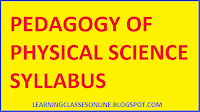PEDAGOGY OF PHYSICAL SCIENCES
B.ED SYLLABUS
After completion of the course, student
teachers will be able to:
1.
acquaint
them with the teachings of physical sciences
2.
develop
awareness about developments in the area of teaching and learning of physical
sciences
3.
understand
the methods and skills of teaching physical sciences
4.
develop
competencies to teach at various levels in the Indian school conditions
5.
prepare a
lesson plan
6.
acquiring
skills relating to planning the lessons and presenting them effectively
7.
develop
scientific thinking in themselves, students and communities
8.
understand
the importance of educational technology for teaching physical sciences
9.
understand the techniques of evaluating science teaching and to construct an
achievement test to assess the learning outcomes of pupils
10.
estimate the
facilities required for the
organization and maintenance
of science laboratory
11.
understand
the special qualities of a science teacher and to acquire those qualities
12.
acquire a
favorable scientific temper towards science teaching and values
COURSE
CONTENT (SYLLABUS)
UNIT-1
Importance of Teachings of Physical Sciences
·
Nature,
Concept & Scope of Physical Sciences and its Place in the School
Curriculum.
·
History of
Physical Sciences with special emphasis on Teaching of Physical Science.
·
Aims and
Objectives of Teaching Physical Sciences.
·
Differentiate
between the terms ‘Aims’ and ‘Objectives'.
·
Aims of teaching Physical Sciences at Middle, Secondary and Senior Secondary stages.
·
Bloom’s
Taxonomy of educational objectives.
·
Instructional Objectives
of teaching Physical Sciences at the school stage and their formulation.
·
Physical
Science Teacher: Qualities & Responsibilities.
·
Need for
Professional Orientation.
UNIT -2
Approaches & Methods of Teaching Physical
Sciences
·
Development
of Teaching Skills through Micro Teaching (Probing Questions,
·
Introducing
the Lesson, Explaining, Illustration with Examples, Using Chalkboard and
Stimulus Variation).
·
Methods of
teaching Physical Sciences (Lecture cum Demonstration method, Project method
and Problem Solving method).
·
Aids,
Equipment and Assistance in teaching Physical
Sciences:
·
Need and
utilities of Physic Sciences Laboratory.
·
Preparation
and use of Teaching Aids.
·
Unit and
Lesson Planning.
·
Popularization
and Propagation of Physical Sciences through Science Exhibition,
·
Science
Magazine, Science Trip and Science Quiz.
·
E-teaching of
Physical Sciences using technology for self-learning and collaborative learning
of science
UNIT-3
Pedagogical Analysis of contents in Physical
Sciences
·
Contents
Analysis, Pedagogical Analysis, and their comparison.
·
Study of
items: Division of units into sub-units, Teaching requirements,
Instructional objectives, Teaching strategies, Previous knowledge
testing, Topic announcement, Concepts of contents, Presentation, Teaching
aids use, Demonstration experimental verification,
Thought to provoke questions and Criterion based tests.
·
Pedagogical
analysis of any one of the following topics:
o
ATOMIC
STRUCTURE
o
ENERGY AND
It's TYPES
o
ENVIRONMENT
AND POLLUTION
o
WATER AS A
UNIVERSAL SOLVENT
o
TRANSMISSION
OF HEAT
o
MAGNETISM
o
FRICTION
UNIT-4
Evaluating Outcomes of Physical Sciences
Teaching
·
Indicators
of Quality Learning and Major Issues in Classroom Learning with special
reference to Physical Sciences.
·
Concept of
Test, Measurement, and Evaluation.
·
Differentiate
between the terms ‘Examination’ and ‘Evaluation'.
·
Qualities of
a good test, Principles, and steps in the construction of an achievement test,
·
Blue
·
Print and
Question Paper, Item analysis, Construction of multiple-choice questions,
·
Diagnostic
test, Remedial teaching in physical sciences.
·
Continuous
and comprehensive evaluation, Formative and summative assessment,
·
Grading pattern.
·
Selection of
appropriate evaluation technique.
Task
& Assignments: Any one of the following
·
Preparation
of Unit Plan and two lesson plans on any topic of Physical Science included in
the Science textbook of secondary school.
·
Write Book
Review on any two books in Physical Sciences.
·
Write Review
on Science Exhibition, Science Trip, Science Fair, Science Fiction Movie and
Scientific Environment of Class.
·
Preparation
of a unit/ achievement test on any topic by developing the Blue Print and the
test items conforming to the blueprint.
·
Preparation
of a model/tool/ device based on any principle of Physical Sciences.
·
Any other
project/assignment given by the institution.
SUGGESTED
READINGS AND BOOKS FOR PEDAGOGY OF PHYSICAL SCIENCE:
·
Gupta, S.K.
(1985). The teaching of Physical Science in Secondary
Schools. New Delhi: Sterling Publications (Pvt.) Limited.
·
Joshi, D. (2012).The methodology of Teaching Science. New Delhi: Dorling Kindersley (India) Pvt. Ltd.
·
Mangal, S.K.
(2009). The teaching of Physical Sciences. New Delhi: Arya Book Depot.
·
Pandey. (2003).
Major Issues in Science Teaching. New Delhi: Sumit Publications.
·
Radha,
M.(2010). The teaching of Physical Science. New Delhi: Neelkamal Publishers.
·
Rahi, A.S. (2012). Pedagogy in Physical Sciences and Teachers. U.S: Createspace Publications.
·
Sharma, R.C.
(2006). Modern Science Teaching. New Delhi: Dhanpat Rai Publications.
·
Sonika,
R.(2012). The methodology of Teaching Science. New Delhi: Dorling Kindersley (India) Pvt. Ltd.
·
Sood, J.K.
(1992). New Directions in Science Teaching. Chandigarh: Kohli Publishers.
·
Vanaja, M.
(2010). Educational Technology. New Delhi: Neelkamal Publishers.
Similar Posts
💁Hello Friends, If You Want To Contribute To Help Other Students To Find All The Stuff At A Single Place, So Feel Free To Send Us Your Notes, Assignments, Study Material, Files, Lesson Plan, Paper, PDF Or PPT Etc. - 👉 Upload Here
अगर आप हमारे पाठकों और अन्य छात्रों की मदद करना चाहते हैं। तो बेझिझक अपने नोट्स, असाइनमेंट, अध्ययन सामग्री, फाइलें, पाठ योजना, पेपर, पीडीएफ या पीपीटी आदि हमें भेज सकते है| -👉Share Now
If You Like This Article, Then Please Share It With Your Friends Also.
Bcoz Sharing Is Caring😃
For the Latest Updates and More Stuff... Join Our Telegram Channel...



Post a Comment
Please Share your views and suggestions in the comment box